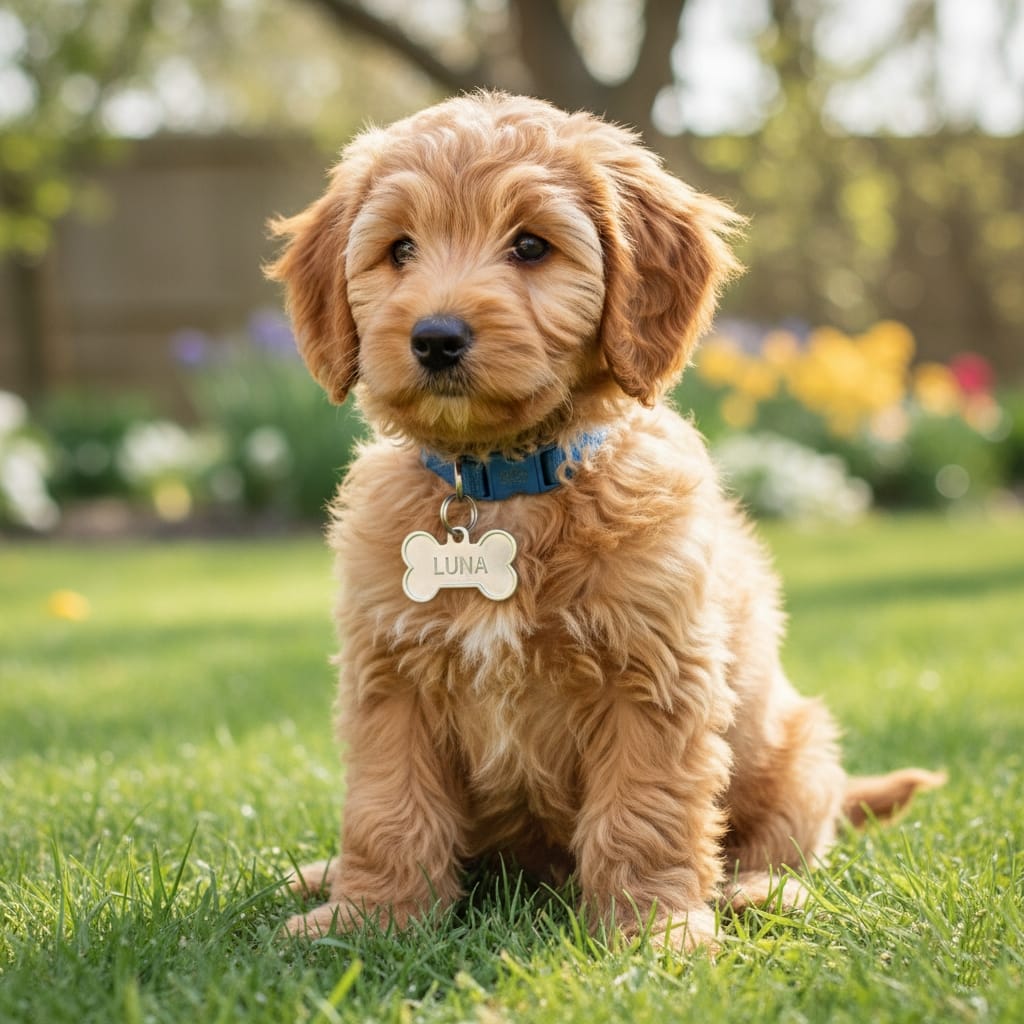
Ultimate Guide to Picking the Perfect Dog Name
Choosing the best dog name for your furry companion is an exciting and important task.
A dog’s name is not just a label, but a reflection of their personality and a key component in building a strong bond between you and your pet. According to a survey by Rover.com, 56% of dog owners believe that a dog’s name plays a significant role in shaping their identity.
As you embark on this naming journey, it’s essential to consider various factors that will help you select a name that both you and your dog will love for years to come.
In this ultimate guide, we’ll walk you through the process of picking the best dog name, from understanding your dog’s unique characteristics to exploring popular naming trends and inspiration sources.
We’ll also cover practical considerations, such as ease of use, cultural sensitivity, and legal requirements. By the end of this guide, you’ll be well-equipped to choose a name that perfectly suits your pooch and sets the stage for a lifetime of happy adventures together.
Know Your Dog
Before you start scratching your head the best dog name, take a moment to understand you pup.
Every dog is unique, and their name should reflect their individual qualities and characteristics. Start by considering your dog’s breed, as certain breeds may have naming conventions or cultural associations.
For example, many German Shepherd owners opt for strong, commanding names like “Max” or “Luna,” while Chihuahua owners often prefer cute, playful names like “Taco” or “Peanut”.
Next, observe your dog’s personality.
Is your pup energetic and mischievous, or calm and gentle? A name like “Ziggy” or “Bolt” might suit an active, playful dog, while “Zen” or “Whisper” could be perfect for a more laid-back companion. Don’t forget to take your dog’s physical attributes and markings into account as well.
A name like “Spot” or “Patch” could be a great fit for a dog with distinctive fur patterns.
Remember, your dog’s name will be a constant presence in their life, so take the time to choose one that truly captures their essence. As dog trainer Victoria Stilwell notes, “A dog’s name is not just a random word; it’s a representation of their identity and a way for you to communicate with them” (Stilwell, 2020).
Factors to Consider When Choosing a Dog Name
Now that you have a better understanding of your dog’s unique qualities, it’s time to explore the various factors that should influence your name choice. While your personal preferences and style will certainly play a role, it’s essential to keep your dog’s well-being and your daily interactions in mind.
- Ease of pronunciation and recognition – A name that is too long or complicated may be difficult for your dog to learn and for you to say consistently. Stick to names with one or two syllables, as they are easier for dogs to recognize. For example, names like “Max,” “Luna,” or “Charlie” are short, sweet, and easy for your dog to understand.
- Avoid names that sound similar to commands or other pets’ names in your household. You don’t want to confuse your dog by having a name that sounds too much like “sit,” “stay,” or “no.” Similarly, if you have multiple pets, choose names that are distinct enough to prevent any mix-ups during training or daily life.
- Your dog’s breed and size can also influence your name choice. A large, powerful breed like a Great Dane or a Rottweiler may suit a strong, commanding name like “Thor” or “Zeus,” while a small, delicate breed like a Chihuahua or a Pomeranian might be better suited to a cute, playful name like “Peanut” or “Tinkerbell.”
The perfect dog name should be a reflection of your personal style and preferences while prioritizing your dog’s needs.
As Dr. Stanley Coren, a professor of psychology and author of “The Intelligence of Dogs,” suggests, “The best dog names are those that are easy to say, short, and have a positive connotation”.
Inspiration Sources for Dog Names
If you look around, you will find unlimited sources of inspiration for your dog’s name. From popular culture to nature and everything in between, the possibilities are endless.
Here are some ideas to get your creative juices flowing:
Human Names vs. Unique Dog Names
- Many dog owners opt for human names like “Max,” “Charlie,” or “Lucy,” which can give your pup a more personable, relatable feel. 50 Cent named his dog “Oprah”. There is an interesting story behind this but the point is, you can also choose a celebrity name for your dog.
- Others prefer unique, dog-specific names like “Biscuit,” “Rover,” or “Snoopy,” which can highlight your dog’s distinct personality.
Cultural and Geographic Influences
- Consider names inspired by your dog’s breed origins, such as “Sakura” for a Japanese Shiba Inu or “Loki” for a Norwegian Elkhound.
- Geographic names like “Rio,” “Sydney,” or “Denver” can also be a fun way to pay homage to your favorite places.
Literature, Movies, and Popular Media
- Draw inspiration from your favorite books, movies, or TV shows, such as “Sherlock” for a clever pup or “Arya” for a brave and adventurous dog.
- Pop culture references like “Yoda,” “Khaleesi,” or “Groot” can be a fun way to showcase your interests and sense of humor.
Historical and Mythological Names
- Names from history and mythology, such as “Athena,” “Apollo,” or “Julius,” can lend a sense of grandeur and timelessness to your dog’s identity.
- These names often have powerful, positive connotations that can reflect your dog’s strength and nobility.
Nature and the Environment
- Look to the natural world for inspiration, with names like “Maple,” “Jasper,” or “Ember” that evoke the beauty and wonder of the great outdoors.
- These names can be particularly fitting for dogs who love to explore and have a strong connection to nature.
Remember, the key is to choose a name that resonates with you and your dog. As Jessi Larson, founder of My Dog’s Name, advises, “The best dog name is one that you love saying and that your dog responds to positively”
Popular Dog Naming Trends
Just like fashion and music, dog naming trends come and go. While some names remain timeless classics, others rise in popularity due to cultural influences or celebrity endorsements. Here are some of the most popular dog naming trends to consider:
Classic and Timeless Names
- Names like “Max,” “Charlie,” “Lucy,” and “Daisy” have been popular for decades and show no signs of losing their appeal.
- These names are easy to remember, versatile, and suitable for a wide range of dog breeds and personalities.
- Pop Culture-Inspired Names
- Movies, TV shows, and celebrities can have a significant impact on dog naming trends. For example, the name “Bella” skyrocketed in popularity after the release of the “Twilight” series (Rover.com, 2021).
- Other popular pop culture-inspired names include “Loki,” “Khaleesi,” and “Groot,” reflecting the ongoing influence of franchises like Marvel and Game of Thrones.
- Unique and Creative Names
- Some dog owners prefer to stand out from the crowd with unique, creative names like “Whiskey,” “Kale,” or “Zephyr.”
- These names can be inspired by anything from food and drinks to nature and mythology, and can reflect your dog’s distinct personality or appearance.
- Gender-Specific vs. Gender-Neutral Names
- While some owners prefer gender-specific names like “Max” for male dogs and “Lucy” for female dogs, others opt for gender-neutral names like “Charlie” or “Frankie.”
- Gender-neutral names can be particularly useful if you plan to adopt a dog before knowing their sex, or if you simply prefer a more versatile name.
Ultimately, the most important thing is to choose a name that you and your dog love. As Dr. Mary Burch, director of the AKC Family Dog Program, notes, “The best dog names are ones that are short, easy to say, and have a positive meaning for you and your family” (American Kennel Club, 2021).

Naming by Sound and Ease of Use
When choosing a name for your dog, it’s important to consider not just the meaning and style of the name, but also its sound and ease of use.
A name that is difficult to pronounce or sounds too similar to common commands can lead to confusion and frustration for both you and your dog.
- The Phonetic Appeal of Dog Names
- Dogs respond best to names with two or fewer syllables, as they are easier to recognize and remember (American Kennel Club, 2021).
- Names with hard consonants like “K,” “T,” or “D” can be particularly effective, as they create a sharp, distinct sound that captures your dog’s attention.
- The ‘Command-Friendly’ Dog Name Test
- Before settling on a name, make sure it doesn’t sound too similar to common commands like “sit,” “stay,” or “no.”
- Names that rhyme with or closely resemble commands can confuse your dog and make training more challenging. For example, “Kit” might sound too much like “sit,” while “Bo” could be mistaken for “no.”
- Avoiding Names That Sound Like Common Commands
- In addition to avoiding names that rhyme with commands, it’s also a good idea to steer clear of names that contain command words within them.
- For example, names like “Stacy” or “Bono” might be problematic, as they contain the commands “stay” and “no” within them.
- Choosing Names That Are Easily Recognizable for Dogs
- When selecting a name, consider how it will sound to your dog’s ears. Names with distinct, easy-to-recognize sounds are more likely to capture your dog’s attention and facilitate training.
- Avoid names with soft consonants or those that are too similar to other words commonly used around your dog, such as “treat” or “walk.”
As certified dog trainer Cathy Madson emphasizes, “A dog’s name should be short, snappy, and easy for them to understand.
It’s the foundation of your communication and relationship with your furry friend”
The Gender Factor
When choosing a name for your dog, you may want to consider whether you prefer a gender-specific or gender-neutral name.
While some owners have a strong preference for names that clearly indicate their dog’s sex, others opt for more versatile, unisex names.
- Gender-Specific Names: Pros and Cons
- Gender-specific names like “Max” for males and “Lucy” for females can help others quickly identify your dog’s sex, which can be useful in social situations.
- However, these names may feel limiting or too predictable for some owners who prefer more unique or creative options.
- Unisex Dog Names
- Unisex names like “Charlie,” “Frankie,” or “Remy” can be a great choice if you want a versatile name that works well for any dog, regardless of sex.
- These names can be particularly useful if you plan to adopt a dog before knowing their sex, or if you simply prefer a more gender-neutral approach to naming.
- Considering Future Breeding Plans
- If you plan to breed your dog in the future, you may want to choose a name that complements their registered or “official” name.
- Many breeders follow specific naming conventions for their litters, such as using a particular letter or theme for each generation. In these cases, a more neutral or versatile name can be a good choice to avoid any potential conflicts.
Ultimately, the decision between a gender-specific or gender-neutral name comes down to personal preference.
As veterinarian Dr. Ashley Gallagher notes, “There’s no right or wrong answer when it comes to choosing a gender-specific or unisex name for your dog. The most important thing is that you choose a name that feels right for you and your furry friend” (Gallagher, 2021).
The Family Dynamic
Choosing a dog name is often a family affair, with everyone wanting to contribute their ideas and preferences.
It’s important to involve all family members in the naming process to ensure that everyone feels heard and satisfied with the final decision.
- Involving the Family in the Naming Process
- Set aside time for a family brainstorming session, where everyone can share their favorite name ideas and discuss the pros and cons of each option.
- Consider setting up a voting system or a ranking process to help narrow down the choices and reach a consensus.
- Names That Fit with Other Pets’ Names
- If you have other pets in the household, you may want to choose a name that complements or coordinates with their names.
- For example, if you have a cat named “Luna,” you might choose a celestial-themed name like “Orion” or “Stella” for your new dog.
- Avoiding Confusion with Family Members’ Names
- To prevent confusion and awkward situations, it’s best to avoid choosing a dog name that is identical or very similar to a family member’s name.
- This is especially important if you have young children who may struggle to differentiate between their own name and the dog’s name.
Involving the whole family in the naming process can be a fun and bonding experience, as long as everyone remains open-minded and respectful of each other’s ideas.
As family therapist Dr. Carla Manly suggests, “Collaborating on a dog’s name can be a great opportunity for families to practice communication, compromise, and teamwork” (Manly, 2021).
Longevity and Adaptability
When selecting a name for your dog, it’s important to consider how well the name will stand the test of time and adapt to your dog’s changing life stages.
- Picking a Name That Suits All Life Stages
- Choose a name that will be appropriate for your dog as they grow from a puppy to an adult and eventually a senior.
- Avoid names that are too juvenile or cutesy, as they may not suit your dog’s personality or appearance as they mature.
- Considering Potential Nicknames
- Think about potential nicknames that could arise from your chosen name, and make sure you’re comfortable with these variations.
- For example, if you name your dog “Sebastian,” be prepared for nicknames like “Seb,” “Baz,” or “Bash.”
- The Option for Formal and Informal Names
- Some owners like to give their dogs both a formal name and an informal name or nickname, which can be a great way to adapt to different situations or life stages.
- For example, you might call your dog “Theodore” in formal settings, but use the nickname “Teddy” at home or with friends.
Choosing a name with longevity and adaptability ensures that your dog’s name will remain relevant and appropriate throughout their life.
As Dr. Marty Becker, a veterinarian and author, advises, “Your dog’s name should be able to grow with them, from their rambunctious puppy days to their more settled senior years” (Becker, 2020).
Cultural Significance and Respect
In today’s diverse and interconnected world, it’s crucial to be mindful of cultural sensitivities and respect when choosing a name for your dog.
A name that may seem harmless or humorous to you could be offensive or disrespectful to others.
- Being Mindful of Cultural Sensitivities
- Research the meaning and cultural significance of potential names to ensure they are not offensive or inappropriate.
- Avoid names that are associated with religious figures, deities, or sacred practices, as this can be seen as disrespectful by members of certain faith communities.
- Avoiding Offensive or Controversial Names
- Steer clear of names that are associated with historical figures or events that are controversial, divisive, or associated with oppression or violence.
- Avoid names that perpetuate stereotypes or make light of serious issues such as mental health, addiction, or social injustice.
- Respecting the Dog’s Heritage
- If you have a dog with a specific cultural heritage, such as a Shiba Inu from Japan or a Chihuahua from Mexico, consider choosing a name that honors and respects that heritage.
- Research names that are popular or meaningful within the dog’s culture of origin, and consider the cultural significance of these names.
By being mindful of cultural sensitivities and choosing a respectful name for your dog, you demonstrate empathy and understanding for others.
Dr. Wailani Sung, a veterinary behaviorist, notes, “Choosing a culturally appropriate name for your dog shows respect for diversity and can help foster positive relationships within your community.”
Legal and Registration Considerations
Understanding Registration Requirements
When you register your dog with organizations like the American Kennel Club (AKC), the name must follow their rules.
The AKC allows up to 50 characters, including spaces. Names can’t use profanity, suggest awards or titles, or include kennel names without permission. Other registries and local councils may have their own limits, so always check their websites before submitting.
Potential Restrictions on Dog Names
Some countries or cities restrict names that sound offensive or misleading.
For working or service dogs, names that resemble commands or official terms should be avoided. Breeders often include their kennel prefix, so if your dog came from one, confirm whether you must use it.
The Impact of Naming on Microchipping and ID Tags
Your dog’s name does not affect microchip registration, but it does appear on ID tags.
Use the exact name you’ll call your dog every day to avoid confusion. Tags should also include your phone number and address as required by local laws.
Testing the Name
The Shout Test in a Public Place
Say the name out loud as if you were calling your dog from across the park.
If it feels awkward, too long, or hard to pronounce, try something shorter. A good name should sound clear and natural when spoken at normal or raised volume.
Observing Your Dog’s Response to the Name
Use the name during play, feeding, and walks.
If your dog looks at you, wags their tail, or comes when called, the name works. If they ignore it, try a name with sharper sounds like “k,” “t,” or “r.” These catch a dog’s attention more easily.
Getting Feedback from Friends and Family
Ask a few people to say the name out loud. Notice if they pronounce it the same way you do. Their reaction can also help you tell if the name feels right or sounds odd to others.
Dog Name Generator Tools
How They Work
Generators mix name databases with your filters. You pick gender, length, theme, or breed. The tool returns lists and suggestions to spark ideas.
Pros and Cons
Generators save time and break writer’s block. They give many options fast. They can feel random and lack personal meaning. Use them to get ideas, then pick a name that fits your dog.
Top Online Tools to Try
- Rover Dog Name Generator — simple filters for size, gender, and personality.
- Pedigree Name Generator — good for AKC-style names.
- Nameberry Pet Name Finder — themed lists and name meanings.
- NewDogNames.com — curated dog name lists from all over the world. Unique and practical suggestions grouped by sound, theme, and trend. If you want fresh, usable names you will not find everywhere, check NewDogNames.com.
Changing Your Dog’s Name
Reasons for Changing a Dog’s Name
You may change a name because it does not fit the dog. Or it may be too long, hard to say, or similar to a common command. You may want a fresh start after adoption. Or you may prefer a name that suits your family better.
Adopting an Older Dog
Keep the old name if it works.
That reduces stress. If the old name is harmful or you must change it, pick a new name with a similar sound. This helps the dog learn faster.
When a Name Change Helps
Change the name when it causes confusion, feels awkward in public, or conflicts with a household member’s name. Also change it if the name carries a bad meaning or offends others.
How to Transition to a New Name
- Pick a short clear name with one or two syllables.
- Choose a name with similar sounds to the old name if possible.
- Say the new name often during play and feeding. Keep your tone happy.
- Pair the new name with treats and praise every time the dog looks at you.
- If the dog knows the old name, use both names together at first. Then drop the old name.
- Call the name from short distances. Increase distance as the dog responds.
- Be consistent. Have everyone use the same new name the same way.
- Expect days to weeks for the change. Reward progress. Do not punish mistakes.
Frequently Asked Questions (FAQs)
How many syllables should a dog’s name have?
One or two syllables work best. Dogs recognize short, sharp sounds faster, especially during training or recall.
Can I name my dog after a family member or friend?
Yes, but ask first. Some people may find it flattering, others may not. If unsure, use a variation of the name instead.
Is it okay to give my dog a human name?
Yes. Many popular dog names like Charlie, Luna, or Molly are human names. Choose one that feels natural to say often.
What if I regret the name I chose for my dog?
You can change it. Follow a slow transition and reward your dog when they respond to the new name.
Can I give my dog a name that’s already popular?
Yes, but expect to meet other dogs with the same name at parks or vets. If you want something unique, visit NewDogNames.com for fresh and rare ideas tailored for American dog owners.
How many dogs have the same name as mine?
According to U.S. pet data, names like Bella, Max, and Lucy rank among the top choices. You can check updated name trends and rankings at NewDogNames.com.
Should I change my dog’s name if I don’t like it after a while?
If you no longer like it and your dog doesn’t seem attached to it, yes. Use positive reinforcement to help your dog learn the new one.
Can a dog’s name affect its behavior?
Not directly. Behavior depends on training and environment, not the name. However, a clear and pleasant name makes communication easier, which helps training go smoothly.
Additional Resources
Name Generators and Online Directories
Explore online tools that give name ideas by theme, sound, or breed. NewDogNames.com offers a wide range of lists made for U.S. dog owners, from classic names to trending ones. You can filter by gender, size, or style and find options that fit your dog perfectly.
Books and Articles on Dog Names
You can also read books like The Complete Book of Dog Names by George Green or articles on training and naming from the American Kennel Club (AKC). These help you understand what makes a name effective and how dogs respond to it.
Community Forums for Personal Stories and Advice
Join online dog forums and social groups to see what other owners have chosen.
Platforms like Reddit’s r/dognamesideas or Facebook dog lover groups share real experiences and ideas. You can also share your picks and get feedback on NewDogNames.com comment sections.
Final Thoughts
Pick a short, clear name that fits your dog and is easy to say.
Test names during play and walks. Use one or two syllables and avoid names that sound like commands. Have everyone use the same name for consistency. A good name speeds training and strengthens your bond.
For fresh, American-focused name ideas, visit NewDogNames.com.



Leave a Comment